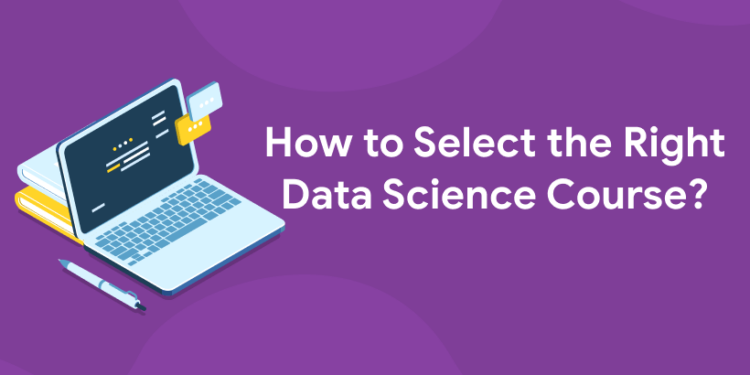Table of Contents
As the field of data science continues to grow in popularity, more and more people are looking to take classes that will help them jumpstart their careers. Here, we’ll lay out some tips on how to select the right data science course, whether you want to become an independent consultant or build skills to get a job with one of the top tech companies in the world. There are hundreds of online data science courses and certification programs out there, so it can be difficult to know where to start your search. You don’t want to spend your time and money on something that won’t teach you what you need to learn, but picking the right course can be difficult without guidance.
Data science has become one of the most in-demand disciplines in today’s business world, and as such, courses that teach aspiring data scientists everything they need to know have popped up all over the internet. However, sorting through these courses can be a tedious task. How do you know which course will be the best fit for you? What should you look out for when choosing? Here are the ways to help you select the right best data science course. Data science has been called the sexiest job of the 21st century, and it’s easy to see why. Data science jobs are in high demand, and they pay well, too—often much better than other comparable jobs. But data science isn’t something you can learn in just any old course; it requires special training that covers all aspects of this emerging discipline, which is a combination of statistics, computer programming, and business management. To get an idea of what you should look for in your data science course, read on to find the ways to select the right one for you! Data science courses are popping up everywhere these days—and with them, the confusion over which one is right for you.
Are you aspiring for a booming career in IT? If YES, then dive in |
||
Full Stack Developer Course |
Python Programming Course |
Data Science and Machine Learning Course |
What is a Data Science Degree?
You don’t need a data science degree to be a data scientist. Instead, there are plenty of ways to learn how to do it yourself. There are plenty of resources that will teach you all about data science without requiring you to spend thousands of dollars on an education. Not only can these tools help you build your own education and career in data science, but they’ll also give you skills that transfer into other aspects of life: critical thinking, creativity, communication, problem-solving… and more!
What are Entry-Level Data Science Jobs like?
This can be a good question for those trying to decide which course to take. If you’re thinking about going into a data science career, it’s worth knowing what your life might look like at entry-level. Entry-level jobs vary depending on where you are and who you work for, but some typical aspects of these positions include: keeping track of business analytics, managing databases and reporting to decision-makers, exploring datasets, and gathering information through sampling (sometimes from non-traditional sources), using algorithms to analyze data in new ways, identifying trends and insights in order to optimize business strategy and more.
get data science and ml certification course ! 100% placement assistance !
Do you want to get started with Data Science?
Great! Then you’re probably looking for an affordable and high-quality best data science course. Maybe you’ve even tried a few courses already and they just didn’t live up to your expectations. That can be a problem, but it doesn’t have to be. Here are some tips that will help you find a course that meets your needs—and gets you started on a successful path toward becoming a data scientist.
1) Find out what level of experience you’re at: A beginner or advanced learner?
2) Figure out what type of learner you are: Do you learn best by watching videos, reading books, or doing exercises? Be honest with yourself about how well different methods work for you.
3) Consider these three factors when comparing potential classes: teaching quality, relevance to your goals in data science careers, and price (with the budget in mind).
4) Read reviews from other students about each class before signing up.
Learn Data science and Machine learning with Placement. Join Entri now
Are you interested in Programming Languages/Technologies?
Python, R, SQL? Or perhaps you’re wondering how data scientists use big data tools like Hadoop or Spark? Maybe you want a background in business analytics. Or maybe you want to move into a role where you can communicate with both humans and machines. Whichever direction you go, having some background knowledge of programming languages and technologies will only help your cause. You might think that taking an entry-level course is enough, but if it’s focused on teaching Python syntax without explaining why Python is used in data science applications (for example), then it’s probably not going to be that useful. That said, there are a lot of different options out there. You may want to start by looking at our list of best data science programs from last year. If none of those meet your needs, we’ve compiled 10 ways to find the right data science course for you. 1) Know what skills and types of jobs you’re interested in.
2) If you know what types of languages/technologies you want to learn about, see if any courses offer those areas.
3) Ask yourself what type of program suits your needs – would an online course work better than a Bootcamp?
Do you want Lifetime Access, Videos, and Other Material?
While there are some great free resources out there, many people opt for paid courses. They often offer a lot more structure and additional materials such as working files, reports, and other project materials. In addition, they might also include a certificate of completion or lifetime access to their platform. However, if you’re not sure whether data science is really your thing (and if it is worth paying money), you might want to consider a free option. Luckily, there are many: Try the Entri app’s Data science and Machine learning Online Classes – all highly recommended!
Do you need guidance from an Instructor and Peers (online)?
Depending on your level of experience and comfort in learning independently, an online data science course may or may not be a good fit. In most cases, you can learn on your own using books, videos, and tutorials. But working alongside other learners (particularly those who are also looking to further their careers) can help give you greater motivation and accountability—and can even save you time by discussing concepts with classmates rather than learning them on your own. Keep in mind that some courses do require access to certain software tools; if that’s an issue, then consider which platforms might work best for you.
Practical Sessions
Choose a course that offers practical sessions so you can apply what you learn. Going through a trial-and-error process is one of the best ways to acquire real-world skills. A live lab is also ideal because it allows students to ask questions and get help if they are struggling with any concepts or assignments. If none of these features are present, look elsewhere; otherwise, you might just waste your time and money on something that doesn’t work for you. When choosing a course, ask yourself: What does this offer me? Do I have access to mentors who will be available when I need them? How much support do I have after purchasing the program? Can I continue my education at a discounted rate if I want to earn a certification in this field? Am I likely to use the material long after finishing the program? Make sure there’s enough variety in content from one lesson to another. Too many courses seem like they were all written by the same person.
Enroll in our latest data science course in the Entri app
Enquire about the Placement Opportunities
When selecting a data science course, it is important to make sure that you are choosing a program with strong industry connections. Not only will these connections be valuable when it comes time to look for employment, but in many cases, they are required if you want your tuition costs waived (see above). Ask about current partnerships with companies and see what you can learn from them. If possible, try and arrange an interview with someone who works at one of these partner companies or conduct a phone call with someone in their HR department. Many students find that formal interview practice greatly improves their chances of landing a job after graduation—and no one wants to do another round of courses! In addition to making use of industry partners for career assistance, consider whether there are any schools nearby where you could work part-time during your studies. Finally, ask about internships: does the school have a robust internship program? Do all accepted students get placed into internships? Is there any opportunity for international internships?
| Our Other Courses | ||
| MEP Course | Quantity Surveying Course | Montessori Teachers Training Course |
| Performance Marketing Course | Practical Accounting Course | Yoga Teachers Training Course |











